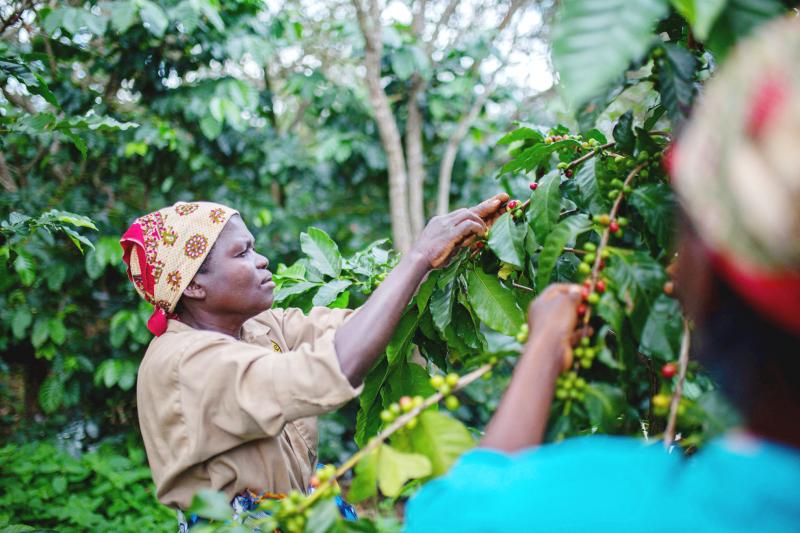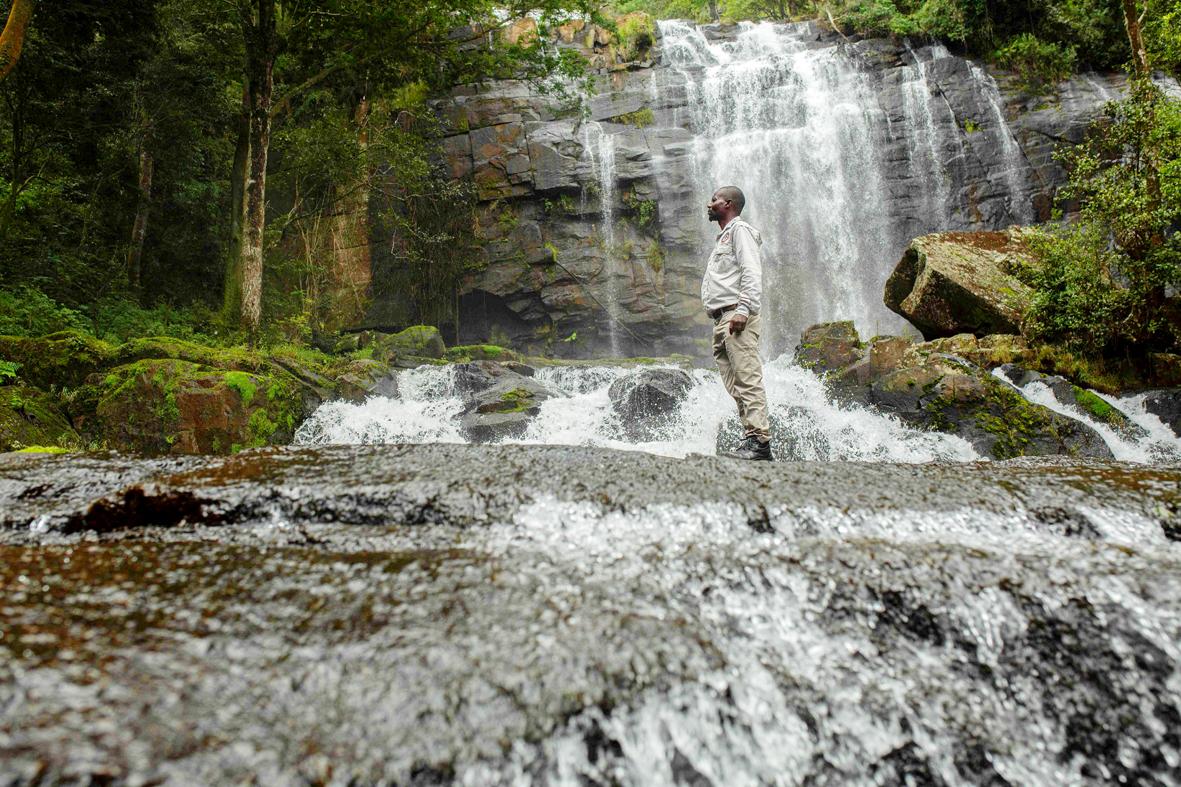From a distance, Mount Gorongosa looks pockmarked.
The slopes of this Mozambican landmark were once covered with verdant rain forest. Now, they are scarred by deep holes — the result of clearcutting that exposed the soil and parched it, leaving only shrubs and grasses.
But in recent years, the forest has been growing back, thanks to a previously foreign crop: coffee.

Photo: AFP
As Juliasse Samuel Sabao walks through the plantation, at an altitude of some 1,000 meters, he points out the obvious progress.
One side of the track resembles a desert. On the other, a dense forest shelters carefully placed coffee plants.
“Before, this was completely empty. Today, you see the result. Coffee needs shade to grow. So, for every coffee plant, we plant a tree as well,” he said.

Photo: AFP
Sabao, who works for Gorongosa National Park, fled to Zimbabwe to escape Mozambique’s civil war. There, he discovered coffee culture.
He brought that knowledge back with him to help restore the mountain, which was largely cut off from the world for decades.
LEGACY OF WAR
Mozambique fought a bloody war for freedom from Portugal, but after independence in 1975, a civil war ravaged the country until 1992.
A smaller conflict later erupted in 2013, ending with a peace treaty in 2019.
During the conflicts, Renamo rebels who used the mountain range as a war-time base and stronghold, exploited the park’s natural resources to the brink of environmental collapse.
Pedro Muagara, a trained agronomist and the park’s director, had planted a few seedlings, until the conflict shattered his coffee dreams.
As the war dragged into its final years, besieged rebels camped on the mountain slopes with their families. They cleared the forest to grow crops to survive. Now he’s back, teaching communities new ways of farming.
“These people depended on subsistence farming, because they can’t afford machinery like tractors. That turned them into agricultural nomads,” he said.
“So, they’d clear a few areas, and then deforestation stripped nutrients from the soil. The land got depleted, and when that happened, they’d go clear another patch.”
The peace treaty didn’t solve the problems of communities on the mountain.
“They didn’t have the training or the means to transition from being itinerant farming to conservation farming,” Muagara said. “We had to explain to them that when they lose a tree, they lose their livelihood with it.”
SAVING TREES
Coffee plants take several years to become productive, so the program also includes food crops so the communities can still support themselves.
The World Bank says Gorongosa now has some 300,000 coffee plants as well as 400,000 cashew trees, 400 beehives and 300 new jobs.
Gorongosa coffee is exported around the world, with profits ploughed back into the plantation.
The forest’s revival reflects Gorongosa’s larger rebirth, since a 20-year partnership was formed in 2008 between Mozambique and the foundation of American philanthropist Greg Carr.
The World Bank has praised the partnership as a model, which has benefited some 200,000 people in the area.
The program also aligns with the government’s goal of improving agriculture and moving beyond exports of raw commodities, said Celso Correia, Agriculture and Rural Development minister.
“One of the biggest challenges in the agriculture sector is the lack of mechanization, and the need for technology transfers,” he said. “The priority is to mobilize resources, but also to improve mobility, developing infrastructure and transportation, so that we can improve the value chain.”
With the war in Ukraine, “commodity price inflation is also affecting Mozambique. We need to alleviate this pressure... increase production, (and) be self-sufficient,” he said.
“We can’t depend on international projects.”

Climate change, political headwinds and diverging market dynamics around the world have pushed coffee prices to fresh records, jacking up the cost of your everyday brew or a barista’s signature macchiato. While the current hot streak may calm down in the coming months, experts and industry insiders expect volatility will remain the watchword, giving little visibility for producers — two-thirds of whom farm parcels of less than one hectare. METEORIC RISE The price of arabica beans listed in New York surged by 90 percent last year, smashing on Dec. 10 a record dating from 1977 — US$3.48 per pound. Robusta prices have

A dozen excited 10-year-olds are bouncing in their chairs. The small classroom’s walls are lined with racks of wetsuits and water equipment, and decorated with posters of turtles. But the students’ eyes are trained on their teacher, Tseng Ching-ming, describing the currents and sea conditions at nearby Banana Bay, where they’ll soon be going. “Today you have one mission: to take off your equipment and float in the water,” he says. Some of the kids grin, nervously. They don’t know it, but the students from Kenting-Eluan elementary school on Taiwan’s southernmost point, are rare among their peers and predecessors. Despite most of

The resignation of Taiwan People’s Party (TPP) co-founder Ko Wen-je (柯文哲) as party chair on Jan. 1 has led to an interesting battle between two leading party figures, Huang Kuo-chang (黃國昌) and Tsai Pi-ru (蔡壁如). For years the party has been a one-man show, but with Ko being held incommunicado while on trial for corruption, the new chair’s leadership could be make or break for the young party. Not only are the two very different in style, their backgrounds are very different. Tsai is a co-founder of the TPP and has been with Ko from the very beginning. Huang has

Nine Taiwanese nervously stand on an observation platform at Tokyo’s Haneda International Airport. It’s 9:20am on March 27, 1968, and they are awaiting the arrival of Liu Wen-ching (柳文卿), who is about to be deported back to Taiwan where he faces possible execution for his independence activities. As he is removed from a minibus, a tenth activist, Dai Tian-chao (戴天昭), jumps out of his hiding place and attacks the immigration officials — the nine other activists in tow — while urging Liu to make a run for it. But he’s pinned to the ground. Amid the commotion, Liu tries to